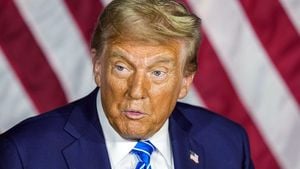With the shockwaves still rippling through the global arena, Donald Trump’s unexpected win has ignited debates about the future of international relations, trade policies, and military alliances. After surviving what many are calling an assailant's plot against him, Trump is set to step back onto the political stage as the 47th President of the United States. This scenario reels observers back to his previous term from 2016 to 2020, which was marked by contentious foreign policy decisions and unilateral actions.
One of the most pressing questions now is how Trump’s return will impact the North Atlantic Treaty Organization (NATO). During his last presidency, he frequently made waves by questioning the alliance’s relevance and pushing for changes to how member states share defense expenses. His stance stirred anxiety among European allies who count on the United States for military support, particularly against threats from Russia.
Opponents of Trump’s agenda have voiced significant concerns. Analysts worry about the instability he may bring to already shaky partnerships. Some countries with longstanding defense agreements with the U.S. could feel under pressure to reevaluate their reliance on American support. Given the current backdrop of increased military activities by Russia, especially with the situation surrounding Ukraine, Trump's approach could affect Eastern European countries like Poland and the Baltic states.
Turning to trade matters, Trump’s presidency from 2016 brought forth aggressive tariffs against China, impacting American consumers and businesses alike. His focus on protecting American jobs led to the phenomenon known as 'America First', and it seems he is ready to recommit to this approach. The possible return of heavy tariffs could lead to increased prices for goods and create turbulence within U.S. businesses dependent on international supply chains.
Interestingly, some Chinese analysts predict Trump’s hardline stance on international trade will paradoxically present opportunities for China as well, allowing them to solidify relationships with nations frustrated by the U.S.'s fluctuative policies. There's speculation about how Trump's unpredictability might reshape important economic agreements and traditional allegiances globally.
Among international observers, India seems to be riding the waves of optimism. Prime Minister Narendra Modi’s past rapport with Trump translates to hope for stronger defense and economic ties. Historically, the Trump administration showed warm support for India, fostering initiatives like the “2+2” dialogue aimed at enhancing military cooperation. Should this warmth continue, India may find itself positioned as a primary ally for the U.S. amid rising tensions with China.
Yet, there are subtle currents to navigate. India’s balancing act between the U.S. and Russia, highlighted during the Ukraine conflict, could become more complex under Trump. While the Biden administration offered its support to Ukraine, Trump's views are somewhat more skeptical, which could force India to confront the repercussions of its independent foreign policy.
The geopolitical chessboard extends beyond just these two countries. Trump's anticipated Second Term could see significant developments with Russia. Analysts point to Trump’s previously friendly posture toward Putin as raising concerns about U.S. support for Ukraine. By advocating for reduced financial backing for Ukrainian efforts, Trump could initiate discussions around negotiating peace terms, drastically shifting the course of the conflict.
With China watching closely, the dynamics change even more. Trump's firm stance on China's trade practices could reignite competition, stirring nationalism and prompting both nations to adopt aggressive strategies on multiple fronts, from trade to technology. Such re-engagement might threaten previously established partnerships for both Trump’s administration and Chinese officials.
The uncertainty around Trump also extends to multinational organizations—NATO is caught between potentially less U.S. commitment and the rising need for European allies to increase their defense spending significantly. Any decline in U.S. military budgets could embolden rival powers and escalate tensions, particularly with Russia remaining ever watchful.
Therefore, as the world awaits Trump’s next moves concerning geopolitical maneuvers, it’s clear the stakes have escalated considerably since his last presidency. Allies could fall under intensified pressure to prioritize transactional agreements over long-term relationships, marking potentially seismic shifts within existing frameworks. The shaping of American foreign policy under Trump's guiding hand could very well redefine our global alignments, prompting larger questions: How will world nations adapt to the so-called 'America First' philosophy? Can established diplomatic norms withstand the strain of his unconventional actions?
The conclusion of the 2024 election ushers not just the political agenda of the United States, but seems to cast wide shadows globally—this time trapping the world between the responsibilities of established alliances, rising nationalism, and the continual ambitions of great powers.



